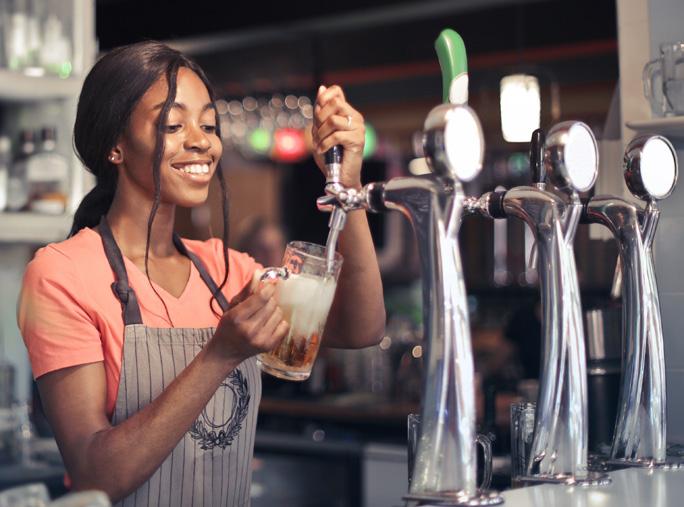
5 minute read
Kenya’s beer
Raise a glass to Kenya’s beer brewers
LOCAL CHOICE
There was a time, and it’s not that long ago, when Kenyans (and, of course, foreign visitors) had nothing much else to quench their considerable thirst than a bottle of ice-cold Tusker – or some other amber beverage straight from the same local brewer, East Africa Breweries (EABL). How things have a changed. The ubiquitous Tusker is, of course, still popular but neatly repackaged and re-bottled since 2015 by the once all-conquering EABL, but today the Kenyan beer market is so much less uniform. And it’s a lot better for it.
For as long as anyone can remember, Kenyan beer meant Tusker. Brewed since the early 1920s, the iconic Tusker, with its familiar black and yellow elephant logo dominated the market. And, more recently, ably supported by the slightly more refined Tusker Malt and Tusker Lite as well as a variety of labels such Pilsner and Pilsner Ice, White Cap and White Cap Lite plus Balozi pale lager, the ultralow-cost Senator Keg and even Guinness. The brewer has further domestic brands in Uganda (Bell, Uganda Wagari and Allsops) and in Tanzania (Serengeti and Uhuru Peak).
Taken together, the various brands under the EABL umbrella still represent a huge market share in Kenya and across East Africa. But this is being nibbled away at from both ends, by both carefully crafted niche brands from local suppliers and premium imports at one end and a race to secure the value-for-money keg sector at the other.

UPSTART
The biggest and most impressive of these upstart brands and prepared to go head to head with EABL had been the Keroche Brewery. Set up by the formidable Tabitha Karanja and surprisingly located in Naivasha – surely an unusual outpost of the world’s brewing industry, Keroche was launched back in 2008. Popular with every-day Kenyans, Keroche produced the Summit Lager and Summit Malt brands and in 2019, launched KB Lager using, for the first time, 70% locally grown cereals and 30% malted barley, it was keenly priced. Sadly, and as the result, of a large unpaid tax bill Keroche Brewery was closed down in early 2022 and its fate remains uncertain.
Going upmarket and aimed at middle-class Kenyans, Nairobi’s exclusive Sierra beer has had a dedicated following. Brewed by Ozzbeco, the various boutique Sierra labels (that’s Amber, Blonde and Platinum plus Imperial Stout) are available from some supermarkets, top hotels and lodges but otherwise take some finding beyond the excellent Sierra Brasserie which is located on the third floor at Nairobi’s Yaya Centre and is part of the same group. But a concern for all Kenyan brewers, but not necessarily for tourists, is a growing taste for internationally recognised beer brands. These can now be ordered online thanks as Oaks & Corks (located off Ngong Road), or alternatively from supermarkets for home consumption and, of course, in the bars of Kenya’s leading hotels.
Then three’s SABMiller, now a BrazilianBelgian corporation, offers several ‘African’ labels – Castle Lager, dark and lovely Castle Milk Stout, Castle Lite and the pale-looking Miller Genuine Draft – and has been in the Kenyan market for quite
some time. Denmark’s Carlsberg Group sells Carlsberg and Tuborg beer in Kenya through distributor King Beverage and can be found in selected hotels.
BOTTLED AND CANNED
The US brewing giant Budweiser arrived in Kenya in 2015 and chose Viva Global as its importer and distributor and offers both bottled and canned beer in Kenya. Additionally, Viva Global sells Corona Extra from Mexico. Imported Heineken is also on sale and the company has set up a regional office in Nairobi. Once imported by EAB, Namibia’s thirst-quenching Windhoek is handled by distributor Kapari which also sells Castle Milk Stout and Castle Lite.
THE MARKET
The only elements that had been missing from the local market had been craft beers and microbreweries. These have burgeoned in South Africa, Europe and the US; but beyond the tasty range of beers from Nairobi’s Brew Bistro & Lounge, run by the Big Five Breweries Company, they had not made much headway in Kenya. But this started to change a couple of years back. The Sirville Brewery at Nairobi’s fashionable Galleria Shopping Mall has been something of a pioneer and only creates beer that conforms to the German reinheitsgebot (or beer purity law). This law states that only four ingredients can be used in the brewing of beer: malt, hops, yeast and water. Sirville has four beers: Tsavo Lager, Mara Pils, Amboseli Ale and Aberdare Bitter. All worth a try. Kenya is now starting to match South Africa and elsewhere and more of the proprietorial microbreweries, such as Bila Shaka and 254 Brewing are springing up – and not just in Nairobi.
BOTTLED VERSUS DRAUGHT
Then there’s the local bottled versus draught beer argument that may not necessarily trouble visitors but it’s worth appreciating. For some unknown reason in Kenya, and it’s a real shame, draught beers (such as Senator Keg) are seen as something of a poor man’s drink or the leftover beer than nobody wants, and it’s served in humble jugs and mugs. Keg beer also tends to compete against sometimes toxic illegal backstreet brews, but is of much superior quality. By contrast and in many other countries, having beer on tap is always considered superior to beer from a bottle. Draught Guinness is a case in point.








